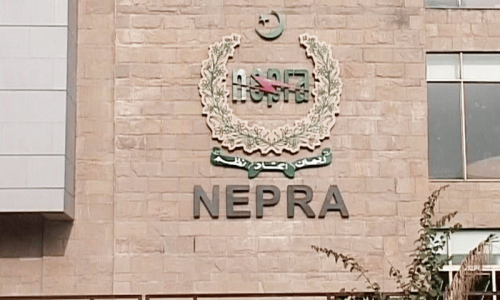ISLAMABAD: As prolonged power outages during sweltering temperatures continue to enrage people, the government and the power regulator on Thursday appeared to be at odds over the question of revenue-based loadshedding.
While addressing a press conference, Power Minister Awais Leghari termed revenue-based power cuts, i.e. suspension of power supply to areas with high pilferage and poor bill recovery, “a necessity”, despite the practice being declared illegal by the National Electric Power Regulatory Authority (Nepra).
“Economic loadshedding has been in practice for six years now and will continue till distribution companies change course and reduce losses and we are able to cut costs,” the minister said.
He said without this, the circular debt would increase by Rs1,200bn per annum, and consumer tariffs would go up by Rs5-6 per unit.
Leghari calls revenue-based loadshedding ‘a necessity’; Nepra chief asks govt to amend law if it wants to continue ‘illegal’ practice
On the same day, Nepra chief Waseem Mukhtar said if the government wanted to continue revenue-based loadshedding it should amend the Nepra Act.
At a public hearing on monthly fuel cost adjustments, Mr Mukhtar said the regulator was making its decisions according to law.
Last month, Nepra fined five Discos Rs50 million each for carrying out revenue-based excessive loadshedding “in violation of laws penalising honest consumers”.
The loadshedding, which started as a strategy for collective punishment more than a decade ago in Karachi and was later adopted by other Discos with the tacit approval of the federal government, has been declared illegal by the regulator.
It ruled that collective punishment to all consumers for the wrongs of a few could not be allowed indefinitely as it was “not in line with the provisions of the Nepra Act, 1997, and Performance Standards (Distribution) Rules, 2005, and has never been recognised by Nepra”, the regulator wrote while imposing fines on Discos.
Transparency in power sector
During the press conference, Mr Leghari said he would bring transparency to the power sector.
The power companies would publish their data of demand, supply and loadshedding daily on their websites, through statements and the Roshan Pakistan app.
He conceded that the total electricity demand peaked at 25,820MW, against which 21,588MW of electricity is being supplied.
The gap was not due to a shortfall, the minister said, adding that loadshedding of 4,232MW was being carried out on high-loss feeders.
He explained that category 3 to 8 feeders — those with 20 to 80pc losses — were subjected to power cuts for 15-16 hours.
“If we supply electricity from these feeders, the economy that is already struggling will collapse.”
He said about 350 feeders in Khyber Pakhtunkhwa, 150 in Punjab, 700 in Sindh and 80 to 90 in Balochistan were facing high losses where the policy of “controlled electricity supply” was being adopted to minimise financial losses and circular debt.
As these losses come down, loadshedding would end completely.
“We have a lot of surplus capacity in the system that we want to supply to consumers as losses and costs come down”, he said.
He however conceded that electricity to category 1 and 2 feeders — with less than 20pc losses — has also been cut because of technical faults or maintenance purposes.
Giving an example, Mr Leghari pointed out that some feeders of Lahore Electric under categories 1 and 2 faced power cuts, which was “technical incompetence”.
Likewise, he said, 15pc of low loss feeders in Multan, 12pc in Gujranwala and 6pc in Faisalabad were without electricity.
“This is not acceptable … and we will correct this,” he added.
The minister said the power division has engaged provincial governments to address the issue of power theft and losses so that the maximum electricity available in the system could be supplied to end users.
While giving an example of transformation of a high-loss feeder to zero loadshedding, he said Fort Munro area of Dera Ghazi Khan — which is in his constituency — used to get electricity for only three hours each day because of high losses.
The minister claimed that in the past 72 hours, four transformers in that area were removed, 38 illegal connections were cut, and several people were arrested.
“As a result, the feeder has now moved to zero load-shedding.”
Responding to a question, he said the KP chief minister had promised to provide personnel of law enforcement agencies for action against power theft.
He also reiterated that there was no change on the cards regarding the solar net metering policy introduced in 2017.
“Policy adjustments would be made in consultation with all stakeholders in future if needed,” he said, adding that electricity units imported from consumers would be adjusted against units exported, and the buyback rate for surplus procurement from consumers would be brought down in line with the basket rate.
Published in Dawn, May 31st, 2024















































Dear visitor, the comments section is undergoing an overhaul and will return soon.